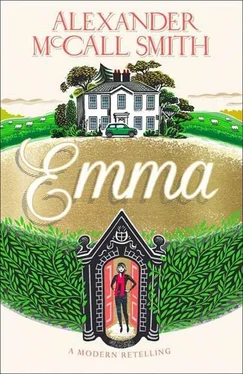Alexander McCall Smith
Emma: a modern retelling
For my daughters, Lucy and Emily
Emma Woodhouse’s father was brought into this world, blinking and confused, on one of those final nail-biting days of the Cuban Missile Crisis. It was a time of sustained anxiety for anybody who read a newspaper or listened to the news on the radio, and that included his mother, Mrs Florence Woodhouse, who was anxious at the best of times and even more so at the worst. What was the point of continuing the human race when nuclear self-immolation seemed to be such a real and imminent possibility? That was the question that occurred to Florence as she was admitted to the delivery ward of a small country hospital in Norfolk. American air bases lay not far away, making that part of England a prime target; their bombers, she had heard, were on the runway, ready to take off on missions that would bring about an end that would be as swift as it was awful, a matter of sudden blinding light, of dust and of darkness. Quite understandably, though, she had other, more pressing concerns at the time, and did not come up with an answer to her own question. Or perhaps her response was the act of giving birth itself, and the embracing, through tears of joy, of the small bundle of humanity presented to her by the midwife.
There are plenty of theories – not all of them supported by evidence – that the mother’s state of mind during pregnancy may affect the personality of the infant. There are also those who believe that playing Mozart to unborn children will lead to greater musicality, or reciting poetry through the mother’s stomach will increase the chances of having linguistically gifted children. That anxiety may be transmitted from mother to unborn baby is an altogether more believable claim, and indeed Henry Woodhouse appeared to be proof of this. From an early age he showed himself to be a fretful child, unwilling to take the risks that other boys delighted in and always interested in the results when his mother took his temperature with the clinical thermometer given to her by the district nurse.
‘Is it normal?’ was one the first sentences he uttered after he had begun to speak.
‘Absolutely normal,’ his mother would reply. ‘Ninety-eight point four. See.’
This disappointed him, and he always showed satisfaction when a doubtful reading required the insertion of the mercury bulb under his tongue a second time.
In due course this anxiety took the form of dietary fads, one after another, involving the rejection of various common foodstuffs (wheat, dairy products, and so on) and the enthusiastic embracing of rather more esoteric fare (royal jelly and malt biscuits being early favourites). These fads tended not to last long; by the time he was eighteen and ready to go to university, he was prepared to eat a normal vegetarian diet, provided it was supplemented by a pharmacopoeia of vitamin pills, omega oils, and assorted enzymes.
‘My son’, said his mother with a certain pride, ‘is a valetudinarian.’
That sent her friends to the dictionary, which gave her additional satisfaction. To dispatch one’s friends to a dictionary from time to time is one of the more sophisticated pleasures of life, but it is one that must be indulged in sparingly: to do it too often may result in accusations of having swallowed one’s own dictionary, which is not a compliment, whichever way one looks at it.
Henry Woodhouse – known to most as Mr Woodhouse – did not follow the career that had been expected of generations of young Woodhouses. While his father had assumed that his son would farm – in an entirely gentlemanly way – the six hundred acres that surrounded their house, Hartfield, the young man had other plans for himself.
‘I know what you expect,’ he said. ‘I know we’ve been here for the last four hundred years …’
‘Four hundred and eighteen,’ interjected his father.
‘Four hundred and eighteen, then. I know that. And I’m not saying that I want to go away altogether; it’s just that I want to do something else first. Then I can farm later on.’
His father sighed. ‘You would be a gentleman farmer,’ he said. ‘You do know that, don’t you?’
The young Woodhouse smiled. ‘I’ve never quite understood that concept. What exactly is the difference between a gentleman farmer and a farmer pure and simple?’
This question was a cause of some embarrassment to the older Woodhouse. ‘These matters shouldn’t need to be spelled out,’ he said. ‘Indeed, it’s not a question that one really likes to answer. And I’m surprised that you feel you need to ask it. A gentleman farmer …’ There was a pause, and then, ‘A gentleman farmer doesn’t actually farm, if you see what I mean. He doesn’t do the work himself. He usually has somebody else to do it for him, unless …’
‘Yes? Unless?’
‘Unless he doesn’t have the money. Then he has to do it himself.’
‘Like us? We don’t have the money, do we?’
‘No, we don’t. We did once, but not any more. And there’s nothing dishonourable about that. Having no money is perfectly honourable. In fact, having no money can often be a sign of good breeding.’
‘And a sign of poverty too?’
There was another sigh. ‘I feel we’re drawing this out somewhat. The point is that it would be a very fine thing if you chose to farm rather than to be … what was it you wanted to be?’
‘A design engineer.’
This was greeted with silence. ‘I see.’
‘It’s an important field. And we need to do more engineering design in this country or we’ll be even more thoroughly overtaken by the Germans.’ This, the young Woodhouse knew, was a fruitful line of argument to adopt with his father, who worried about the Germans and their twentieth-century lapses.
‘The Germans do a lot of that sort of thing?’
‘They do,’ he assured his father. ‘That’s why they’ve been so successful industrially. Their cars, you know, go on virtually forever, unlike so many of our own cars that I’m afraid won’t even start.’
‘Engineering design,’ muttered his father – and left it at that. But the argument had been won by the younger generation, and less than a year later Mr Woodhouse was enrolled as a student of his chosen subject, happy to be independent and away from home, doing what he had always wanted to do.
It proved to be a wise choice. After graduating, Mr Woodhouse joined a small firm in Norwich that specialised in the design of medical appliances. He enjoyed his work and was appreciated by his colleagues, even if they found him unduly anxious – some even said obsessive – when it came to risk assessment in the development of products. The work was interesting, but perhaps not challenging enough for the young engineer, and in his spare time he puzzled over various drawings and prototypes of his own invention, including a new and improved valve for the liquid-nitrogen cylinders used by dermatologists. This device was to prove suitable for other applications, and once he had patented it under his own name – rather to the annoyance of the firm, who mounted an unsuccessful legal challenge – he sold a production licence to a Dutch manufacturer. This provided him with financial security – with a fortune, in fact, with which he was able to renovate Hartfield, revitalise the farm and set up his increasingly infirm parents in the gatehouse. Their ill health unfortunately robbed them of a long retirement, and within a very short time Mr Woodhouse found himself the sole owner of Hartfield.
He had married by then, and in a way that surprised people. Everyone had assumed that the only person willing to take on this rather anxious and obsessed engineer would be either a woman of great charity – and there are plenty of women who seem prepared to marry a project husband – or a woman whose sole interest was financial. His wife was neither of these, being a warm and personable society beauty with a considerable private income of her own. Happily married, Mr Woodhouse enjoyed the existence of a country gentleman even if he continued with his engineering job for some years. A daughter was born in the year following their wedding – that was Isabella – and then another. This second daughter was Emma.
Читать дальше
Конец ознакомительного отрывка
Купить книгу












